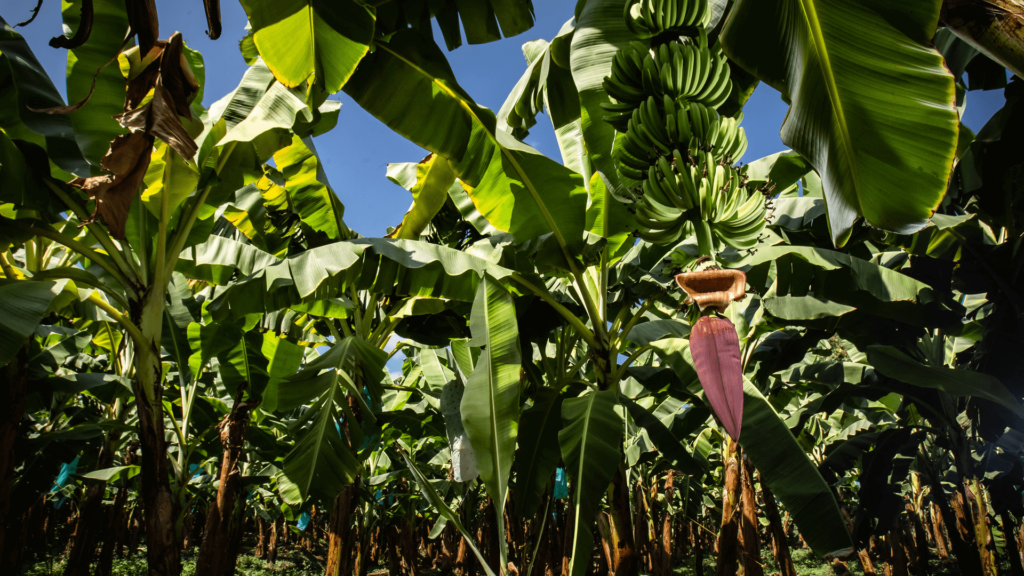Plantación Martha María is a medium-size producer of banana for the export market, located in the Uraba region of northwest Colombia.
Background & Structure
Uraba is a mainly agricultural region and an important producer of bananas, plantains and yams. Bananas are produced exclusively for the export market, with only those that don’t meet quality standards being sold domestically.
The banana industry in Uraba extends to 46.500 hectares and earnings from the export of bananas and plantains account for 90% of the region’s economy.
Martha María is a medium-sized plantation employing 23 field workers and 22 workers in the processing and packing facility. Three women are employed – one in the field, one in processing and one in admin. All workers live in their own or rented accommodation, on average 7km from the plantation.
Production & Sales
Marta María grows bananas on 32 hectares, producing around 1,421 tonnes a year (2011).
Like most producers in Uraba, Marta María markets its bananas through UNIBAN, one of Colombia’s largest banana exporters.
Fairtrade
Martha María was Fairtrade certified in January 2005 and now sells around 80 per cent of production to the Fairtrade market (1,166 tonnes in 2011).
Fairtrade Standards include payment of the Fairtrade Minimum Price and an additional Fairtrade Premium of $1.00 per box for the workers to invest in social and community projects of their choice.
Fairtrade Premium Projects
Regular meetings are held for workers to discuss and decide which projects to fund with the Fairtrade Premium. The premium fund is administered by a committee made up of four elected workers and a management representative who acts in an advisory capacity. The committee is responsible for managing the selected projects and reporting on their progress to the workforce. The various premium projects include:
Housing
- All workers live off the farm so a priority was to set up a low interest loans scheme for workers to build or purchase their own houses.
- Workers can also take out loans for home improvements.
Education
- Equipping local schools with computers and accessories.
- IT training for workers’ children.
- Students grants to cover accommodation and living costs.
- Providing schoolchildren with books and other materials.
- Payment of school enrolment fees.
Health and social
- Grants for medical treatment.
- Provision of free medicines.
- Grants to cover costs of prosthetic limbs.
- Grants to cover hospital patients’ accommodation, food and travel costs.
- Life insurance scheme.
- Low-interest credit scheme – loans for education, healthcare etc.
- Emergency fund – for recovery from domestic calamities and other hardship.
Fairtrade improves quality of life
A research study has concluded that since Fairtrade certification, Plantación Martha María has increased its profitability, improved the quality of its fruit, and has better access to preferential export markets. It also found that Fairtrade is significantly improving the quality of life of workers and their families and greatly contributes to improvements in working conditions on the plantation.
All workers said their quality of life has improved, their financial situation is better and they receive better treatment from their employer; over 90 per cent of workers have permanent written contracts; all workers have access to toilets, drinking water and health services; 75 per cent of workers think their wages are above the average for the region.
Workers said the most important benefits of Fairtrade were better access to education and to loans for housing and home improvements. Nearly all workers have taken out loans and in the last three years more than half of workers have improved their homes – mainly kitchens, roofs and toilets. Ownership of household goods has increased by 56 per cent on average, with all households owning a TV, mobile phone, refrigerator, bicycle and fan, and many now have a washing machine, radio and computer with internet access.
Almost 60 per cent of workers are able to save money, and those that do have increased their savings by at least 85 per cent thanks to Fairtrade.
